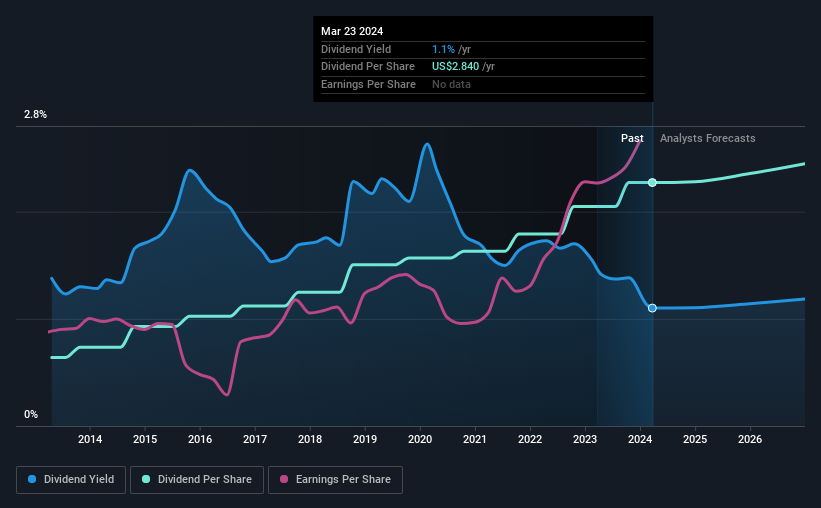Lincoln Electric Holdings, Inc. (NASDAQ:LECO) Looks Interesting, And It's About To Pay A Dividend
Lincoln Electric Holdings, Inc. (NASDAQ:LECO) is about to trade ex-dividend in the next three days. Typically, the ex-dividend date is one business day before the record date which is the date on which a company determines the shareholders eligible to receive a dividend. It is important to be aware of the ex-dividend date because any trade on the stock needs to have been settled on or before the record date. Meaning, you will need to purchase Lincoln Electric Holdings' shares before the 27th of March to receive the dividend, which will be paid on the 15th of April.
The company's upcoming dividend is US$0.71 a share, following on from the last 12 months, when the company distributed a total of US$2.84 per share to shareholders. Calculating the last year's worth of payments shows that Lincoln Electric Holdings has a trailing yield of 1.1% on the current share price of US$258.04. Dividends are a major contributor to investment returns for long term holders, but only if the dividend continues to be paid. As a result, readers should always check whether Lincoln Electric Holdings has been able to grow its dividends, or if the dividend might be cut.
See our latest analysis for Lincoln Electric Holdings
If a company pays out more in dividends than it earned, then the dividend might become unsustainable - hardly an ideal situation. That's why it's good to see Lincoln Electric Holdings paying out a modest 28% of its earnings. A useful secondary check can be to evaluate whether Lincoln Electric Holdings generated enough free cash flow to afford its dividend. Thankfully its dividend payments took up just 26% of the free cash flow it generated, which is a comfortable payout ratio.
It's encouraging to see that the dividend is covered by both profit and cash flow. This generally suggests the dividend is sustainable, as long as earnings don't drop precipitously.
Click here to see the company's payout ratio, plus analyst estimates of its future dividends.
Have Earnings And Dividends Been Growing?
Stocks in companies that generate sustainable earnings growth often make the best dividend prospects, as it is easier to lift the dividend when earnings are rising. If earnings fall far enough, the company could be forced to cut its dividend. For this reason, we're glad to see Lincoln Electric Holdings's earnings per share have risen 17% per annum over the last five years. The company has managed to grow earnings at a rapid rate, while reinvesting most of the profits within the business. Fast-growing businesses that are reinvesting heavily are enticing from a dividend perspective, especially since they can often increase the payout ratio later.
Another key way to measure a company's dividend prospects is by measuring its historical rate of dividend growth. Since the start of our data, 10 years ago, Lincoln Electric Holdings has lifted its dividend by approximately 14% a year on average. It's great to see earnings per share growing rapidly over several years, and dividends per share growing right along with it.
To Sum It Up
Is Lincoln Electric Holdings worth buying for its dividend? Lincoln Electric Holdings has been growing earnings at a rapid rate, and has a conservatively low payout ratio, implying that it is reinvesting heavily in its business; a sterling combination. Overall we think this is an attractive combination and worthy of further research.
So while Lincoln Electric Holdings looks good from a dividend perspective, it's always worthwhile being up to date with the risks involved in this stock. For example, we've found 2 warning signs for Lincoln Electric Holdings that we recommend you consider before investing in the business.
A common investing mistake is buying the first interesting stock you see. Here you can find a full list of high-yield dividend stocks.
Have feedback on this article? Concerned about the content? Get in touch with us directly. Alternatively, email editorial-team (at) simplywallst.com.
This article by Simply Wall St is general in nature. We provide commentary based on historical data and analyst forecasts only using an unbiased methodology and our articles are not intended to be financial advice. It does not constitute a recommendation to buy or sell any stock, and does not take account of your objectives, or your financial situation. We aim to bring you long-term focused analysis driven by fundamental data. Note that our analysis may not factor in the latest price-sensitive company announcements or qualitative material. Simply Wall St has no position in any stocks mentioned.

